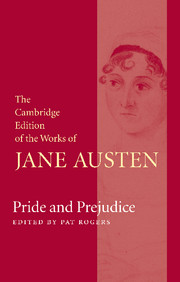Book contents
- Frontmatter
- Contents
- General Editor’s Preface
- Acknowledgements
- Chronology
- Introduction
- Note on the Text
- Pride and Prejudice
- Pride and Prejudice: Volume I
- Pride and Prejudice: Volume II
- Pride and Prejudice: Volume III
- Corrections and Emendations to 1813 text
- Appendix 1 Thomas Egerton and the Publication History
- Appendix 2 Legal and Military Background
- Appendix 3 Pemberley and its Models
- Appendix 4 Note on the second and third editions of Pride and Prejudice
- Abbreviations
- Explanatory Notes
Chapter 5
Published online by Cambridge University Press: 19 December 2020
- Frontmatter
- Contents
- General Editor’s Preface
- Acknowledgements
- Chronology
- Introduction
- Note on the Text
- Pride and Prejudice
- Pride and Prejudice: Volume I
- Pride and Prejudice: Volume II
- Pride and Prejudice: Volume III
- Corrections and Emendations to 1813 text
- Appendix 1 Thomas Egerton and the Publication History
- Appendix 2 Legal and Military Background
- Appendix 3 Pemberley and its Models
- Appendix 4 Note on the second and third editions of Pride and Prejudice
- Abbreviations
- Explanatory Notes
Summary
“I HAVE been thinking it over again, Elizabeth,” said her uncle, as they drove from the town; “and really, upon serious consideration, I am much more inclined than I was to judge as your eldest sister does of the matter. It appears to me so very unlikely, that any young man should form such a design against a girl who is by no means unprotected or friendless, and who was actually staying in his colonel's family, that I am strongly inclined to hope the best. Could he expect that her friends would not step forward? Could he expect to be noticed again by the regiment, after such an affront to Colonel Forster? His temptation is not adequate to the risk!”
“Do you really think so?” cried Elizabeth, brightening up for a moment.
“Upon my word,” said Mrs Gardiner, “I begin to be of your uncle's opinion. It is really too great a violation of decency, honour, and interest, for him to be guilty of it. I cannot think so very ill of Wickham. Can you, yourself, Lizzy, so wholly give him up, as to believe him capable of it?”
“Not perhaps of neglecting his own interest. But of every other neglect I can believe him capable. If, indeed, it should be so! But I dare not hope it. Why should they not go on to Scotland, if that had been the case?”
“In the first place,” replied Mr. Gardiner, “there is no absolute proof that they are not gone to Scotland.”
“Oh! but their removing from the chaise into an hackney coach is such a presumption! And, besides, no traces of them were to be found on the Barnet road.”
“Well, then—supposing them to be in London. They may be there, though for the purpose of concealment, for no more exceptionable purpose. It is not likely that money should be very abundant on either side; and it might strike them that they could be more economically, though less expeditiously, married in London, than in Scotland.”
- Type
- Chapter
- Information
- Pride and Prejudice , pp. 311 - 323Publisher: Cambridge University PressPrint publication year: 2006

